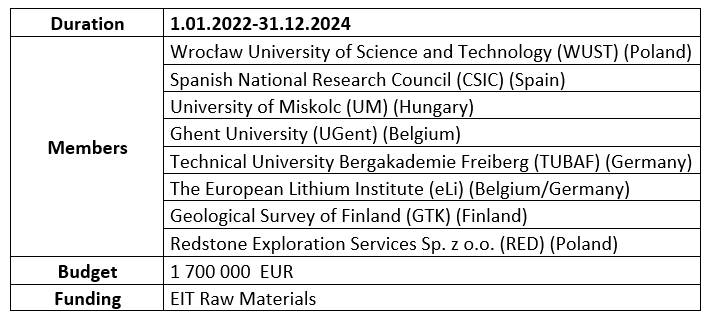About the project
 and Finland
and FinlandLimited access to critical raw materials (CRM) is the main obstacle to developing the high-tech and battery sectors. However, thanks to the striking development of efficient soluble elements recovery technologies, highly mineralised water (brine) is a potential unconventional source of metals. Usually occurring at great depths, under conditions of high pressure and hot temperatures, brines mineralised up to 300-350 g/L may contain economic concentrations of metallic elements, such as CRM from the EU 2021 list (Li, Mg, Sr), Na, Ba and others. Therefore, exploring non-obvious metals resources (such as geothermal brines) and innovative metals recovery technologies is necessary to ensure a sustainable and secure European supply of battery metals. It also supports European Raw Materials Alliance (ERMA) vision “to secure access to critical and strategic raw materials, advanced materials, and processing know-how for EU Industrial Ecosystems”.
The technology needed to recover metallic elements from brines is under development in several KAVA projects, e.g., EuGeLi or Morecovery. However, the location of brines with reliable and stable sources of metals is still an open question. Our BrineRIS project will locate brines in Europe suitable for economically feasible metal recovery and test the emerging recovery technologies in the lab. Focusing on RIS countries of the Iberian Peninsula and Visegrad Group, whose thermal brines resources are proven, the BrineRIS project will deliver verified information on brines enriched in Li and other valuable elements. Special attention will be paid to existing mine water inflows and operating geothermal wells.
BrineRIS intends to achieve three key objectives:
(I) To increase awareness of geothermal brines metallogenic potential in RIS countries by mapping brines resources and estimating the abundance of CRM and other valuable elements with specific attention to lithium. This activity will cover six RIS countries – Poland, Hungary, Czech Republic, Slovakia, Spain and Portugal.
(II) To build the capacity of RIS countries in low-carbon metals mining technologies related to geothermal brines by sharing experience in developing innovative recovery solutions and knowledge exchange with key players in geothermal recovery from non-RIS countries. Through the education and training of students and specialists from RIS countries, BrineRIS will increase the competitiveness and innovativeness of the RIS workforce. These activities will be directed to partners’ countries and stakeholders also from other RIS regions (Baltic, Balkans, Ukraine), offering them free participation to widen the Project’s impact.
(III) To attract investors to RIS countries by developing an interactive platform of potential geothermal brines projects and preparing at least one investment case for the ERMA. That way, we increase the Project’s geographical coverage to worldwide stakeholders. This aim will be supported by close cooperation with the Business Advisory Board (BAB).
Nine partners from six countries representing five CLCs and the three sides of the Knowledge Triangle are involved in our consortium. A diverse consortium composed of RIS and non-RIS partners is focused on knowledge transfer from non-RIS partners to RIS countries and on building the geothermal lithium resources capacity in the ESEE region (Visegrad Group) and the Iberian Peninsula.
BrineRIS is led by Wrocław University of Science and Technology (WUST) (Poland) and partnered by The Spanish National Research Council (CSIC) (Spain), University of Miskolc (UM) (Hungary), Ghent University (UGent) (Belgium), Technical University Bergakademie Freiberg (TUBAF) (Germany), The European Lithium Institute (eLi) (Belgium/Germany), Geological Survey of Finland (GTK) (Finland), Redstone Exploration Services Sp. z o.o. (RED) (Poland), Polish Geological Institute, National Research Institute (PGI) (Poland), Czech Geological Survey (CGS) (Czech Republic), Rotaqua (ROT) (Hungary) and State Geological Institute of Dionyz Stur (SGIDS) (Slovakia)



